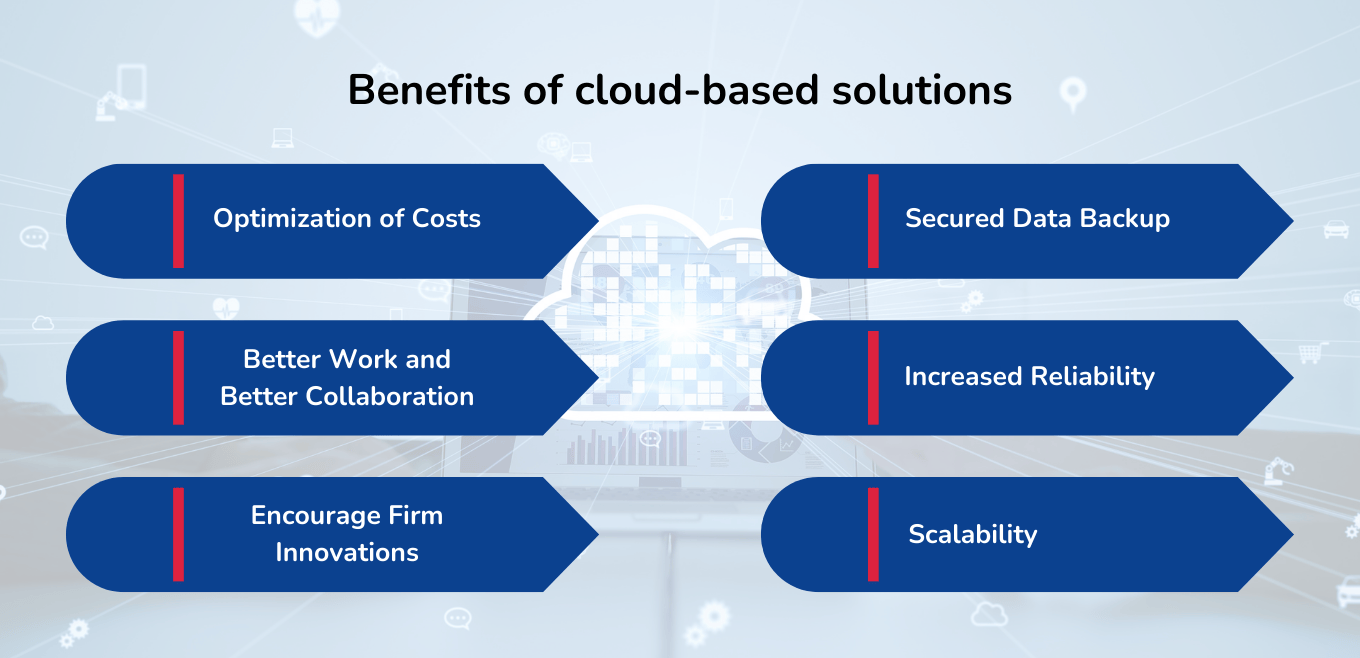Small and medium-sized organizations (SMEs) now depend heavily on cloud technology, which provides scalable SME cloud computing solutions that help them cut expenses and boost efficiency. SMEs may grow and compete with larger companies in a more dynamic market by implementing cloud-based IT solutions. By offering customized cloud-based business solutions, People10 makes sure SMEs can take advantage of cloud computing’s potential while preserving efficiency and security.
Numerous cloud-based business solutions are available from People10, such as enhanced data protection, decreased downtime, adaptable storage choices, and remote access. For companies trying to better manage their client connections and maximize their resources, these capabilities are crucial. SMEs may completely benefit from cloud services with People10, guaranteeing that their operations function seamlessly while remaining secure.
Deploying and administering cloud-based apps made especially for SME needs is one of People10’s extensive IT cloud services. We guarantee that your company takes advantage of the most cutting-edge cloud-based IT solutions, whether through cloud migration, data management, or application maintenance.
What is cloud computing?
The on-demand delivery of computer services, including software, data processing, and data storage, via the Internet is known as cloud computing. Pay-as-you-go is a common way to pay for cloud computing services. Thus, you only have to pay for the cloud native application development and services that you use. This approach reduces running expenses for your business and allows for flexible expansion.
Small business owners need to be able to access data and apps from their PCs, tablets, or smartphones in the quickly changing business world of today. In the field, on the road, or at work. An internet connection and cloud insights enable this access from any location.
Cloud-based storage solutions allow files to be stored in a remote database rather than on a dedicated hard drive or local storage device. Additionally, the information and software needed to run them can be accessed by a device with internet connectivity.
Types of cloud computing
Unlike a phone or chip, cloud computing is not a stand-alone technology. Rather, Platform-as-a-Service (PaaS), Infrastructure-as-a-Service (IaaS), and Software-as-a-Service (SaaS) comprise the majority of this system.
1. Platform as a Service (PaaS)
Of the three layers of cloud computing, PaaS is thought to be the most complex. Although there are some similarities between SaaS and PaaS, the primary difference is that PaaS provides software offline as opposed to online. It is a software development platform that is accessible online. This approach includes platforms such as Heroku and Salesforce.com.
2. Infrastructure as a Service (IaaS)
The term Infrastructure as a Service (IaaS) is a method for delivering any kind of on-demand service via IP-based connectivity, including servers, storage, and operating systems. Therefore, clients can use an on-demand, outsourced service to get these resources rather of purchasing servers or software. Two popular examples of the IaaS system are IBM Cloud and Microsoft Azure.
3. Software as a Service (SaaS)
Licensing software applications to consumers is known as SaaS. To supply licenses, a pay-as-you-go or on-demand system is typically employed. For example, Microsoft Office 365 has this type of functionality.
Benefits of cloud-based solutions
Utilizing cloud-based software, which is accessible through native apps or browsers on any device, can be advantageous for businesses in all industries. Additionally, users may easily move their settings and information between devices. The advantages of cloud computing are numerous. Let’s have a peek!

1. Optimization of Costs
The primary benefit of cloud computing is the optimization of operational costs. You will need to deploy less IT equipment and pay less for maintenance if you move to a cloud ERP solution. Additionally, shifting the majority of your operations to cloud adoption would greatly lessen the workload on IT teams, even though I wouldn’t suggest SMEs do away with them entirely. Lastly, cloud resources provide a useful way to accommodate spikes in corporate activity.
2. Secured Data Backup
For a small business, data loss can be catastrophic. The loss of the files isn’t the only reason; it also costs money and time to restore them. A network disruption costs more than $10,000 per hour, according to CloudRadar.
Reliable data recovery is more of a dream than a reality for most small businesses. Cloud computing is currently being used by many SMBs to buck this trend. Because of their size and expertise, cloud-based services can swiftly restore data from any kind of data disaster, including remotely erasing data from a misplaced laptop.
3. Better Work and Better Collaboration
According to Gartner, 74% of CFOs want to permanently shift 5% of their workforce to remote work. Therefore, most businesses, especially SMEs, are now aware of the potential advantages of remote working for operational effectiveness, even though the pandemic may have accelerated the trend. As a result, cloud computing solutions for remote workers have grown dramatically on a global scale.
Cloud-based monitoring enables remote workers to interact and communicate with other teams. Mobile information access is causing a paradigm change in operational efficiencies for both SMEs and established businesses. Everyone may now work remotely thanks to the cloud ERP system, which acts as a platform that guarantees quick and safe access to data. You can present the required data to the IT department right away.
4. Increased Reliability
In many cases, cloud-based services are more reliable than on-premises services, particularly when servers or other hardware need to be updated. Cloud solution providers can address problems faster than small firms with limited IT resources because they have a committed, experienced IT workforce.
5. Encourage Firm Innovations
What if your business possessed a secret weapon to save costs, win over consumers, increase output, create new revenue streams, and enter new markets? A recent research by the IBM Institute for Business Value found that cloud-based monitoring helps businesses across a wide range of industries make money. This report indicates that cloud-based workflow enables SMEs to:
- Gain easy entry into a new industry or market.
- Expand the functionality of the product as a service without sacrificing usability.
- Get new customers.
- Present cutting-edge client journeys designed for unique client experiences.
- Rapidly develop, produce, and introduce services and goods.
6. Scalability
Scalability in cloud services for businesses refers to the capacity to modify IT resources to meet changing business requirements. It is the most distinctive feature of cloud computing platforms and the main reason why SMEs are adopting them so quickly.
5 Pro tips for an effective cloud computing strategy
Tip #1: Select the best provider of cloud migration services
The process of transferring data and apps from one location—typically a business’s private on-premises servers—to the servers of a public cloud provider is known as cloud migration. Additionally, it may entail alternating between clouds.
Making a solid start in a planned way is essential for a successful migration when moving to the cloud. determining which services and apps should be moved first, with the least amount of interruption, and expanding cloud deployment as needed. The cloud partner will be better able to comprehend the business objectives and provide migration services effectively if the business goals are defined and the minimal expectations are made clear.
Choosing the best cloud migration partner can be just as difficult as choosing the best cloud provider. Having a reliable partner who exhibits strong technical proficiency and extensive knowledge of industry best practices, compliance management, and efficient data management is crucial.
Tip #2: Create a safe and dependable cloud infrastructure for a future connected by technology
Concern over cloud security is growing as a result of firms’ quick digital transformation and the rise in cloud migrations. Strong cyber security is essential for protecting data, apps, and cloud infrastructure from online threats and attacks.
The resources and cloud stack offered by a cloud services provider with substantial cyber security knowledge will guarantee a secure environment that is several orders of magnitude higher than what the typical small to medium-sized business can set up on-site. Cloud service providers offer capabilities that enable data encryption both in transit and at rest, security incorporated into every layer, and defenses against distributed denial-of-service (DDoS) assaults.
In addition to making sure companies stay in compliance with data privacy regulations, responsible cloud partners integrate suitable controls, procedures, and best practices to take proactive measures for infrastructure management and data asset protection.
Tip #3: Make use of modernization techniques to reduce cloud costs and increase scalability
Cloud computing modernization usually entails moving legacy or conventional apps to cloud settings, like private clouds and public cloud platforms.
Eventually, user experience and customer engagement will suffer due to outdated tech stacks. However, in addition to other problems, retiring or upgrading legacy software systems frequently results in significant losses in productivity and money. Therefore, for the majority of SMEs, it has proven more practical and advantageous to upgrade or redesign the current software on on-premises solutions and move to the cloud.
Every modernization project needs to have a clear plan in place to reduce risks and any disruptions to the general operation of the company. The ideal cloud partner will gain a comprehensive grasp of business goals and recommend suitable technologies and solutions for re-architecting old apps.
Because companies no longer have to invest in manual maintenance and modifications, effective cloud engineering for application modernization can lower infrastructure expenses. It gives users access to limitless cloud data storage capacity, enabling need-based space utilization for company growth. Thus, businesses with cloud infrastructure become more scalable and time & cost-efficient. As a result, companies that use cloud infrastructure are able to scale more easily and save money and time.
Tip #4: Pay attention to testing and quality assurance
Because of the process agility, cost-effectiveness, and convenient access to a large talent pool, cloud-based software testing and quality assurance (QA) are quickly displacing on-premise QA.
Continuous application monitoring and data-based issue identification are made possible by cloud computing. When delivering goods or services, cloud quality assurance tools assist companies in identifying performance snags and avoiding errors. Performance is supported by quality testing and cloud application scaling.
Tip #5: Use a disaster recovery plan to guarantee business continuity
Enabling business continuity management and making sure comprehensive catastrophe recovery plans are in place are essential for all small and medium-sized businesses.
Cloud computing In the case of a natural or man-made disaster, Disaster Recovery as a Service (DRaaS) enables companies to safely backup data in a cloud environment and restore access to the IT infrastructure from any location at any time.
Applications can run with little downtime because of Disaster Recovery Orchestration’s on-demand standby computing capabilities. Effective fast recovery planning will ensure that the firm continues to operate normally even in the face of catastrophic catastrophes by preventing inefficiencies in system operation. Having a knowledgeable technical staff to assess issues during occurrences, apply remedies, and design long-term solutions systematically is crucial.
Conclusion
Without question, small and medium business owners may benefit greatly from cloud solutions. They allow you to leave the rest to the cloud platform and concentrate on your goal and key strengths. Furthermore, you may make rapid progress and gain a competitive edge thanks to the scalability and flexibility of cloud solutions.
Without cloud solutions, your SME is losing out on a lot of opportunities. You have the chance to grow, take charge, and inspire others. Because the market is very competitive, it will be advantageous to use technology that helps expedite business operations and save time.
People10 provides IaaS, PaaS, and SaaS solutions to numerous international SMEs. Our IT and cloud solutions have the advantage of greatly enhancing their whole company process.
Ready to Take Your Business to the Next Level?
Discover the power of real partnership with People10 and enhance your business with cloud computing.
Author
A seasoned tech leader with 20+ years of experience, Nisha drives global business development and client relations at People10.


